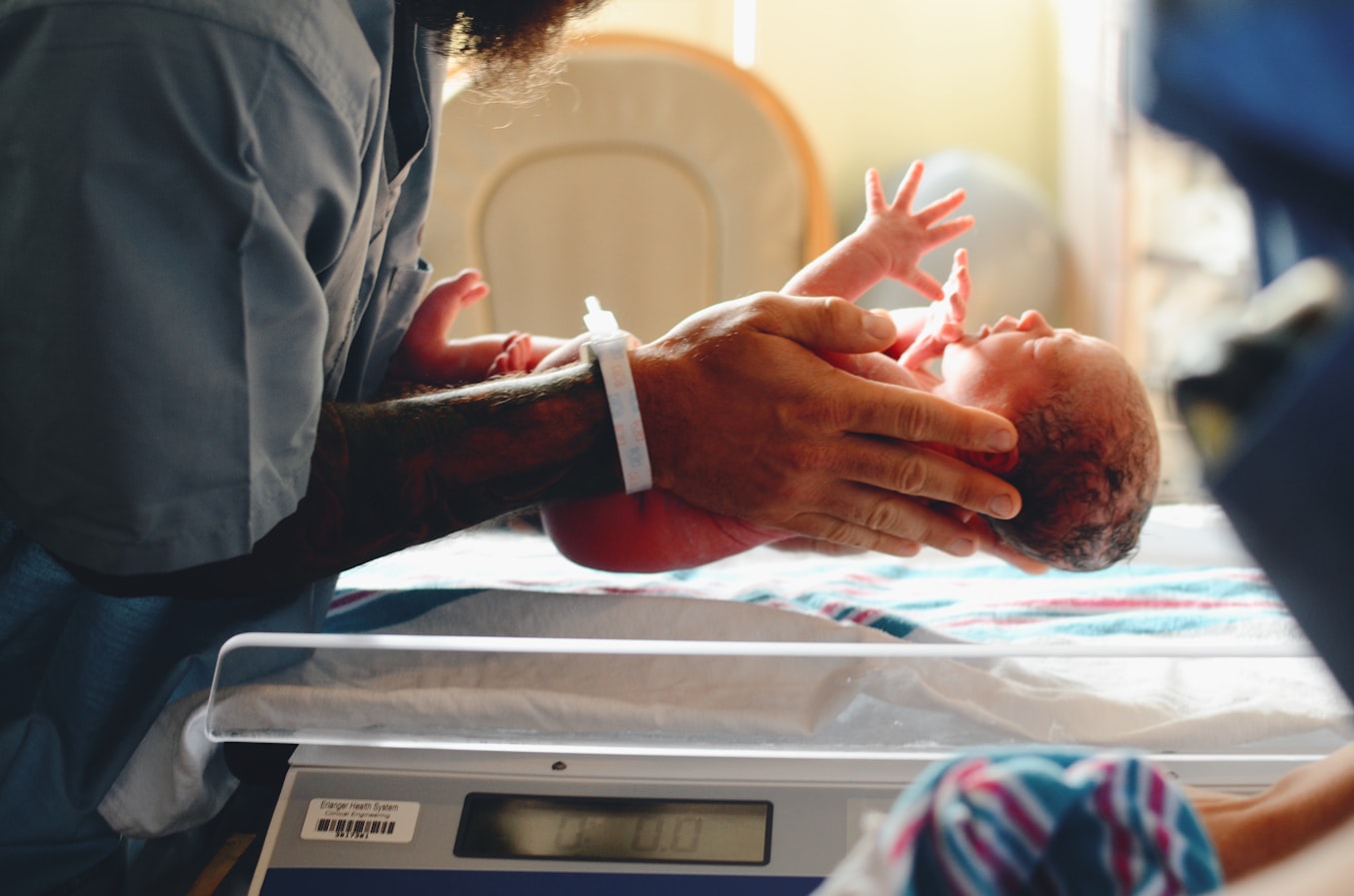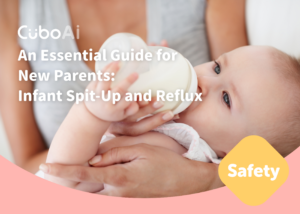Though it’s not something you see everywhere you look in February, this month is actually international prenatal infection prevention month.
As much as we love making the Cubo Ai blog a place where you can come and read feel-good posts about parenting and babies, we also know it’s important for parents to be informed about safety risks to babies and parents. This way, they can be prepared for how to prevent, face, or overcome these risks.
Read more about our commitment to baby safety here.
Guide to this post
- What is prenatal infection?
- Types of prenatal viral infection
- What is the most common prenatal infection?
- Does pregnancy make you immunocompromised?
- How do you know if you have an infection while pregnant?
- Prenatal infection causes
- What is the most effective way to prevent infection?
- Why you should get a prenatal infection screening
What is prenatal infection?
The instant our babies are born is the time we usually imagine their first encounter with danger. Before then, they’re in the safety of their mom’s womb, right? Prenatal infections can mean that that’s not necessarily the case.
Prenatal infection meaning that a baby can contract a viral infection that their mom has before or during birth.

Types of prenatal viral infection
Types of prenatal viral infections vary just as widely as the types of viral infections you can get at any other time of your life.
Whether you’re pregnant or not, you can contract viruses via respiratory droplets, in raw meats or unwashed produce, through mosquitos in certain parts of the world, etc.
All of these types of infections will affect your and your baby’s bodies differently. This is why doctors suggest that you’re extra careful during this time. While you may fight off the infection effectively, your baby could be infected at birth and have adverse effects going into childhood and adulthood.
So, to begin, let’s understand a little more about prenatal infections.
What is the most common prenatal infection?
In a National Birth Defects Prevention study, a group of 4967 mothers to babies without major birth defects showed a variety of self-reported viral infections during pregnancy.
“Overall, 63.6% of women reported at least one infection during pregnancy. Reports of infections were more common during pregnancy than in the 3 months before pregnancy. Nearly half (49.6%) of women reported a respiratory infection, 20.5% reported a fever, 17.1% reported a urinary tract infection, 4.2% reported a yeast infection, and 3.4% reported a sexually transmitted disease.”
This goes to show just how diverse infections can be during pregnancy. Many of these, as shown in the study by the lack of presence of major defects, won’t result in problems to the baby.
Still, preventing and treating any infection that pregnant mothers could encounter is the best way to ensure, to the best of our ability, that babies are born healthy and infection-free.
There are a few particular infections that women worry about most during their pregnancy. Some of these don’t go under their full name and instead sources mention them by acronyms. Regardless, we’ll go through the most commonly-feared infections during pregnancy below.
Cytomegalovirus
Cytomegalovirus (also known as CMV) is a common virus in kids and adults that often doesn’t show symptoms at all. It’s contracted through saliva, urine, blood, breast milk, vaginal secretions, and semen.
Why is CMV a concern for families expecting a new baby?
According to the CDC, “In the United States, nearly one in three children are already infected with CMV by age five. Over half of adults have been infected with CMV by age 40. Once CMV is in a person’s body, it stays there for life and can reactivate. A person can also be re-infected with a different strain (variety) of the virus. Most people with CMV infection have no symptoms and aren’t aware that they have been infected.”
Though it’s a common worry for women who are expecting, it’s not a routine test for either mothers-to-be or newborns. That’s shocking because 1 in 200 babies are born with CMV, so it’s the most common congenital viral infection.
The problems caused by congenital CMV include problems with growth, the brain, liver, spleen, and lungs. Long-term problems even include hearing loss that appears after birth or later in childhood.
So, it makes sense that parents would want to do everything possible to avoid these infections and keep them from passing on to become congenital.
Group B Strep
This isn’t quite the strep you have in mind growing up. In fact, it’s an infection in the vagina or rectum and is present in 25% of women (pregnant and not). Most who have it don’t show any symptoms at all and don’t need treatment to get better.
In newborns, however, it’s a different story. It’s passed during birth (both vaginal and cesarean) and can cause blood infections, pneumonia, and meningitis in newborn babies.
The good news: you can get screened and tested for it during pregnancy and get on IV antibiotics before you give birth.
Listeriosis
Listeriosis is an infection that all people, not just those who are pregnant, are vulnerable to. During pregnancy, it can increase the risk of miscarriage, premature birth, newborn infection, and stillbirth.
Those are some pretty scary things, but before you worry, remember that you can help prevent a listeriosis infection by making sure you’re eating pregnancy-safe foods.
Zika Virus
This virus made news a few years back with an outbreak in South America. The Zika virus comes from a mosquito (specifically, the Aedes mosquito) and is transmitted to humans. People can then transfer it to each other through intercourse. If you get it during pregnancy, your baby could face risks like microcephaly and other brain defects.
The good news: it’s very unlikely that you’ll encounter the Zika virus in your home country. If you’re traveling during your pregnancy, check out the local risks at your destination. You can take more precautions to avoid mosquito bites while you’re there if you just can’t avoid the trip altogether.
Bacterial Vaginosis (BV)
This infection happens when you have too much of one bacteria in the vagina which changes the balance you normally have. It’s the most common vaginal condition between women 15-44. Though experts aren’t sure exactly how it happens, women who get it are usually sexually active.
While doctors don’t how exactly how the infection happens, they do know its more common with women who have multiple sex partners or a new sex partner. It does not happen via toilet seats, bedding, or swimming pools.
You could have any of the following symptoms if you have BV, so if you notice something’s off, consult your doctor:
- Thin white or gray discharge
- Pain, itching or burning
- Fish-like odor
- Burning during urination
- Itching
What it means for your pregnancy
If you have BV and you’re pregnant, it could lead to premature birth or low birth weight (less than 5.5 lbs).
While other women don’t always need treatment when they have BV, pregnant women should seek out treatment to make sure they carry to term and their baby is born at a healthy weight.
Toxoplasmosis
This infection shows up with flu-like symptoms, though most adults never develop any symptoms at all. In fact, they won’t even really need treatment other than to keep an eye on it with your doctor. As we’ve seen with infections before, that’s not quite the case for babies, mothers, and people with weakened immune systems.
The most common way of getting in contact with the Toxoplasma gondii parasite, found in undercooked contaminated meat, infected cat feces, or- if you’re an infant- birth.
If you have it during pregnancy, you might get body aches, swollen lymph nodes, headache, and a fever. You could also be asymptomatic. As a result, you could miscarry or even have a stillbirth.
Babies who get infected can grow up with seizures, develop an enlarged liver and spleen, have symptoms of jaundice, suffer from severe eye infections, and have fatigue. Again, many babies are asymptomatic until their teens, when they can suffer from hearing loss, mental disability, or eye infections.

Does pregnancy make you immunocompromised
Pregnancy itself does not seem to make a person immunocompromised.
What’s said instead is that the immune system is in flux during pregnancy, allowing for foreign organisms (like the embryo) to implant and fetal cells from the father to stick around. More on this here.
In general, the immune system does alright during pregnancy, but if you do happen to contract a virus while pregnant, it can leave your immune system very weak, unable to continue to fight for your and your baby’s health.

How do you know if you have an infection while pregnant?
Since a lot of these prenatal infections don’t show symptoms in adults, the most reliable way to know whether or not you have an infection while pregnant is to go through screening and testing.
A lot of it is already built into routine doctor’s appointments during pregnancy. Your doctor will suggest common prenatal infections to get tested for and you can also request additional tests for peace of mind.
Want a second opinion? Your pediatrician is a great source for extra suggestions on how to be safe and what to get tested for during your pregnancy.

Prenatal viral infection causes
Like we’ve seen in each of these individual infections above, there are many causes for prenatal infections, even though the body is not necessarily immunocompromised.
Following your doctor’s instructions on a pregnancy diet, staying in zika-free zones, avoiding being too close to cats (specifically avoiding cleaning that litter box) and other practical steps can keep you healthy.
Takeaways: what is the most effective way to prevent infection
Most of the suggestions on how to avoid and prevent infections while you’re pregnant will be very straight-forward and stated by your doctor, but just in case, here are some common tips.
For the Zika virus, avoiding travel to areas with Zika will help to prevent infection. If you can’t avid travel or if you currently live in an area with Zika virus, you can take precautions to prevent mosquito bites. If your partner travels to or lives in an area with Zika, use condoms every time you have any type of sex.
To reduce chances of CMV in your baby: don’t share food and utensils with babies and small children and wash your hands after changing diapers.
To avoid Listeriosis: don’t drink unpasteurized milk or food products made from it. Don’t eat any soft cheeses that don’t specifically say they’re pasteurized.
To avoid most other infections: Wash your hands frequently (especially after using the bathroom, touching raw foods, or gardening).
Stay away from wild or pet rodents, especially their droppings. If you have a pest problem at home, temporarily relocate while a professional exterminates them. If you have a pet rodent, give them a new home until your baby arrives.
Finally, like we’ve said before, ask your doctor for screening for prenatal infection.

Why you should get a prenatal infection screening
If you haven’t quite gotten a wake-up call from all the possibilities listed above in this post, the main reason to get a prenatal infection screening is to prevent any bad outcomes.
For your health, your baby’s chances of living a happy, healthy, and long life, avoiding the infections mentioned above is key.
So, what if you do get one of these infections?
Don’t panic! If you get screened during pregnancy, you’ll know what kind of treatment and prevention options you have before you give birth. The best place you can be during pregnancy is that of knowledge.
How was your experience during pregnancy and preventing prenatal infection? Tell us in the comments.
Disclaimer: Cubo Ai’s blog is not meant to be taken as medical advice, but rather raising awareness on topics of baby and parent topics. For more on prenatal recommendations and care, please consult the CDC website.





